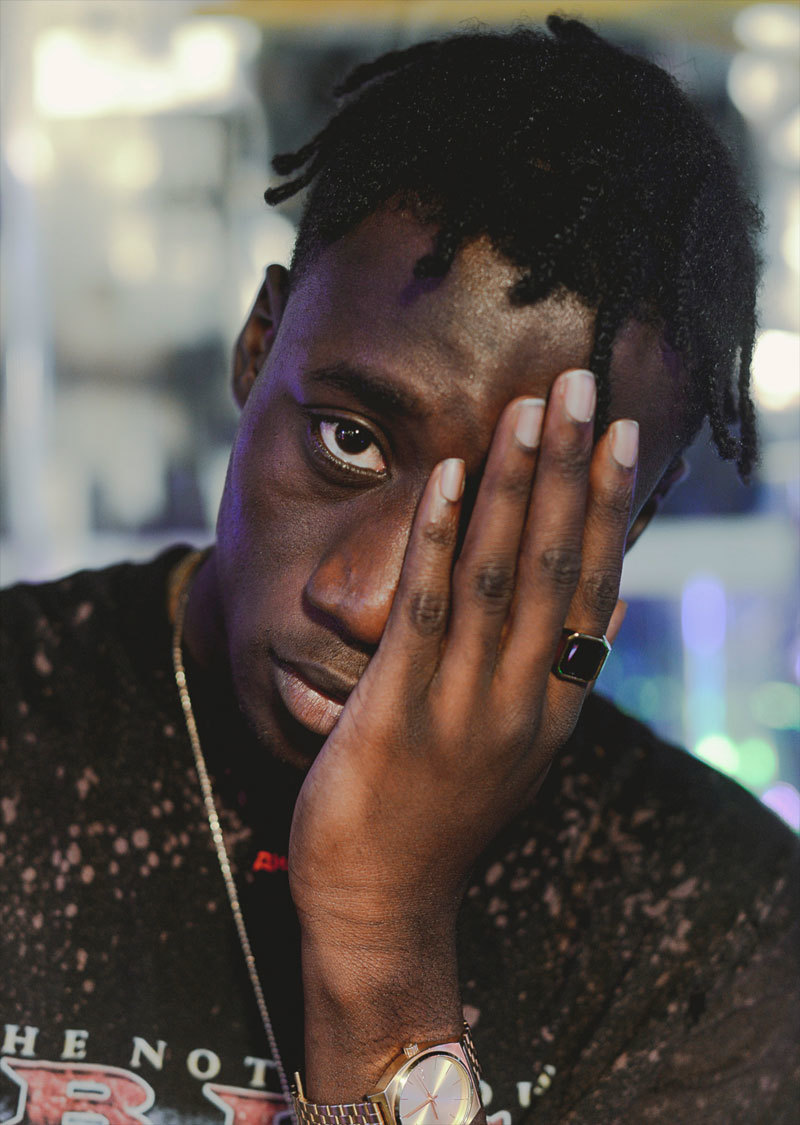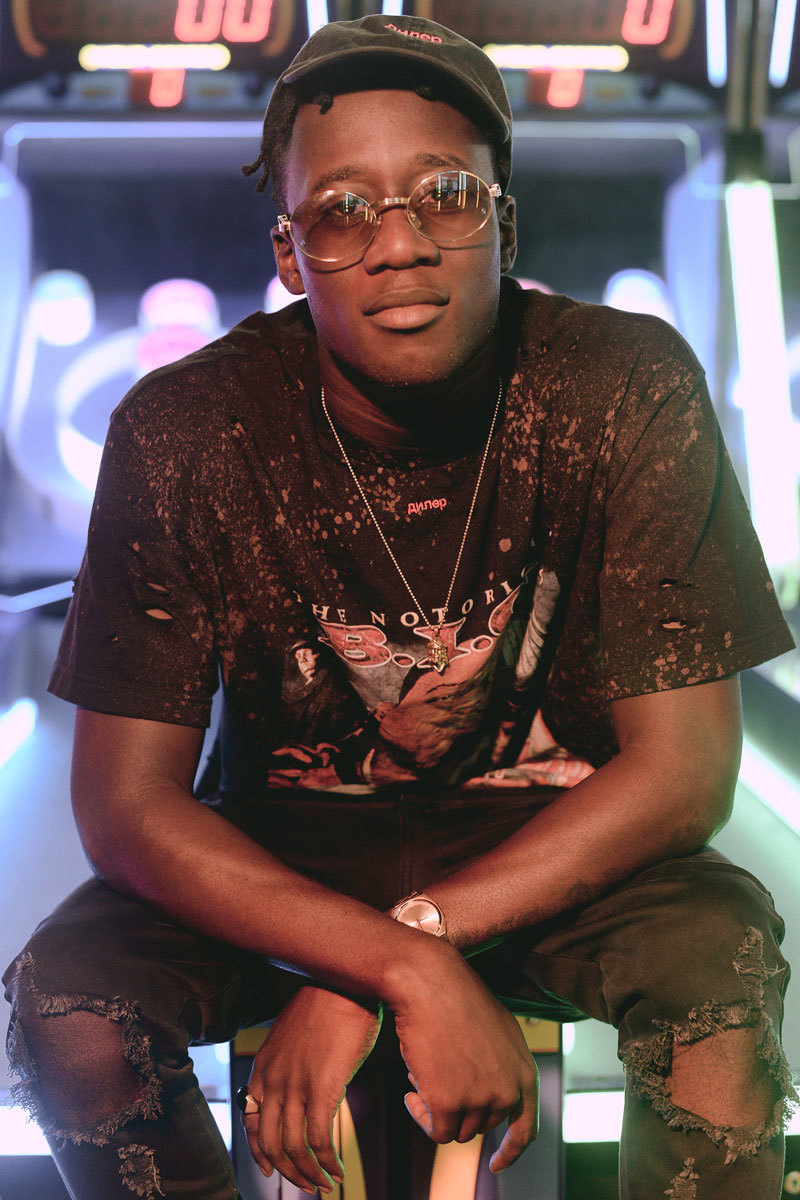When i-D first meets Manu Crook$, we’re side of stage at the club where he’s about to open for Floridian rapper Denzel Curry. Manu plays a twenty minute set to a crowd of six or seven hundred, and by the time he’s leaning into his last song—crowd favourite Assumptions—the entire club is like a heaving, living thing. It’s almost too much excitement. He comes off stage, dripping in sweat, and wearing a tidy grin. An hour later we run into him, his DJ, Ziggy, and their entourage cutting the after party in a nearby McDonald’s.
Assumptions—which premiered on Zane Lowe’s Beats1 back in December—is just one of four tracks released by Manu, all in the last fourteen months, and all exceptional. And not just by Australian hip hop standards. 2015’s Drive Me Crazy was an assertive arrival on the scene, confidently declaring: “I’m here. I can rap, I can sing, I can produce. And I’m making good shit.” 2016 then drip-fed us Everyday and Blowin’ Up, both of which banged, and both of which served to collectively form that moment in an artist’s career where the audience can officially say: Okay. This is the real thing.
To echo probably every single writer who’s put pen to paper about Manu Crook$ so far: if you weren’t listening too closely, you might presume he were part of the Atlantan trap scene. It’s the confidence in the production. It’s the inventive lyricism, and the way Manu’s vocalisations work themselves into a beat, rather than over one. Perhaps most importantly, it’s the ease with which this all happens.
An immigrant to Australia, he grew up in Ghana and settled in Sydney’s western suburbs with his sister and mum when he was 12. Manu was enrolled at Parramatta High School, and spent most of his time on the basketball court, with teenage pipe dreams of making the NBA. He started dancing with a group of kids his age and they called themselves the Syd Kids, setting up on sidewalks with a boombox and dancing for passersby. “It started with the whole jerk movement,” he tells me, doing a miniature jerk in his chair, when we finally sit down for an interview inside Kingpin bowling alley in Melbourne one day.

Dancing led to hanging out with creative people, and the first time he set foot in a studio, he knew he wanted to try producing. He started working on beats with friend Dopamine—whose production weaves in and out of the catalogues of artists Miracle, JOY., and Anfa Rose (to name a few), most of whom are friends of Manu’s, and share a studio about fifteen minutes out of the city. Does he still dance? Not really. Even at the club, he says, he prefers to sit and watch. I saw this first hand once, but I wouldn’t be a journalist if I didn’t note that there were two exceptions to this rule: his own song playing, and an extremely attractive woman approaching. What I really want to know, though, is if he ever sees himself incorporating dance into his live shows—a la Chris Brown or Trey Songz? “Probably not, hey.”
When I mention that, for a person that doesn’t seem to have thirsted too hard for success, Manu has become remarkably successful, he’s quick to quash that perception; “Don’t get me wrong, once I realised ‘yo, this is what I want to do,’ I was in the studio making beats every single day. Every day. I did not leave.” To which I suggest that it’s maybe more of a private thirst. “Exactly,” he says.
On stage, at their shows, it’s just Manu and DJ Ziggy. It’s a testament to their enthusiasm and their genuine talent that the two of them—Ziggy DJing instrumentals and doing backing vocals, and Manu singing, rapping, jumping, running—can captivate and galvanise a crowd on their own. Every time.

With Australian hip hop slowly steering the ship around and taking a turn for the much less infuriating, it’s sometimes a question of ‘what came first’: Are rappers like Manu striking while the iron’s hot? Or is the iron hot because Manu and a few key players are redefining the antipodean hip hop scene? It’s likely the second thing. And it’s likely no coincidence that those key players are almost exclusively first generation Australians—refugees and immigrants. African kids whose upbringings are probably a lot more intrinsically connected to African American culture than, for example, those of the Hilltop Hoods. And it’s an entirely new thing, enfolding in front of us.
While the video for Assumptions dropped last week and satiated us for now, what we’re really waiting on is Manu’s incoming EP. And it’s so close you practically can taste it. But at a strangely mature and considered 23-years-old, Manu’s taking it slow. Track by track, move by move. Even literally moving isn’t being rushed: Manu still lives with his family in Sydney’s North Shore, waiting for the right time. And, predictably, when I ask if the dream of being a successful rapper feels like it’s coming true, he says: “Slowly, slowly. We’re getting there.”
Credits
Text Issy Beech
Photography Jess Brohier
